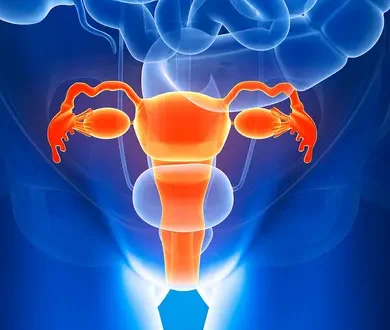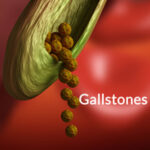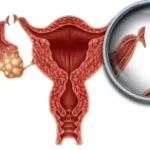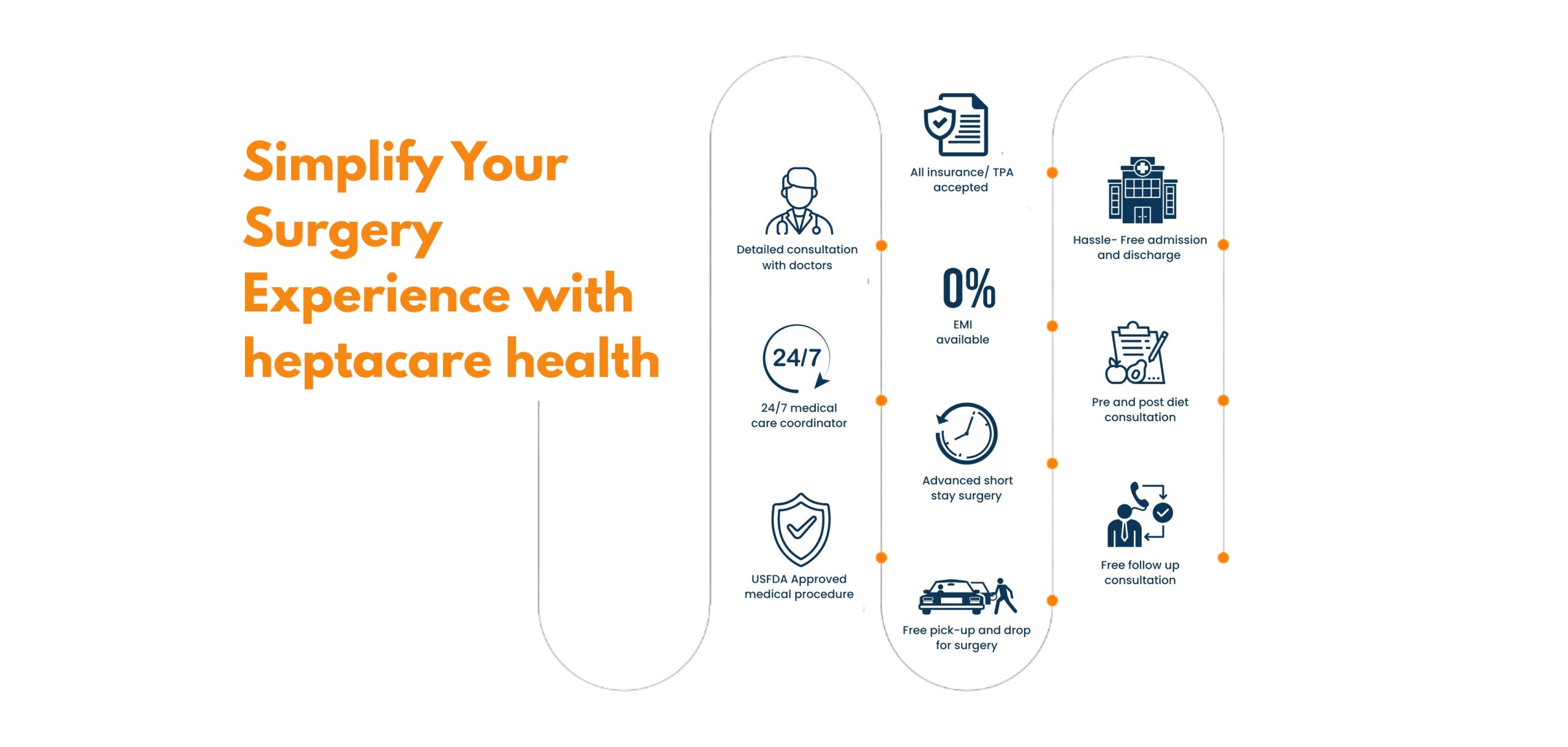Experiencing constant abdominal pain due to gallbladder stones? Consult with HeptaCare Health‘s expert and highly experienced surgeons to undergo gallbladder removal surgery and get permanent relief from gallstones. From consultation to post-operative care, HeptaCare Health strives to provide a seamless and hassle-free patient experience.
Happy Patients
Disease
Hospitals
Cities
Gallbladder stones, or gallstones, are solid particles that develop in the gallbladder, a small organ located under the liver. The gallbladder’s main function is to store and release bile, a fluid made by the liver that aids in digesting fats.
Gallstones can vary in size, from tiny sand-like particles to larger stones resembling pebbles. They can be composed of cholesterol, bilirubin (a waste product from the breakdown of red blood cells), or a combination of both.
Gallstones may not cause symptoms in some people and can remain asymptomatic for long. However, they can cause various health issues if they obstruct the bile ducts, which are tubes that carry bile from the gallbladder to the small intestine. When a gallstone blocks the bile ducts, it can cause severe abdominal pain, known as a gallbladder attack.

Gallstones can be classified into two main types based on their composition:
Doctors use a patient’s medical history, a physical exam, and lab and imaging tests to diagnose gallbladder stones. A healthcare professional will ask you about your symptoms. He or she will also ask if you have a history of health conditions or problems that make you more likely to get gallstones.
The health care specialist may ask if you have a family history of gallstones and what you typically eat. During a physical exam, the doctor examines your body and checks for abdominal pain or other signs of gallbladder issues. Here are the common tests used for diagnosing gallbladder stones:
Surgical Treatment for Gallstones
The surgical treatment for gallbladder stones involves the removal of the gallbladder, a procedure known as cholecystectomy. When gallstones cause symptoms or complications, surgical gallbladder removal is the definitive treatment for long-term relief. Around 80 percent of people with gallstone symptoms will require surgery.
There are two main types of cholecystectomy:
Laparoscopic cholecystectomy is the most common and effective treatment for gallbladder stones. During this procedure, the surgeon makes several small incisions in the abdomen. They insert a laparoscope (a thin, flexible tube with a camera) and surgical instruments through these incisions. To create working space, the surgeon inflates the abdomen with carbon dioxide gas.
Using the laparoscope, the surgeon views the gallbladder and nearby structures on a monitor. They carefully detach the gallbladder from its attachments, including the bile duct and blood vessels. After separating the gallbladder, the surgeon removes it through one of the small incisions. Finally, they close the remaining incisions to complete the surgery.
Because it is minimally invasive, laparoscopic cholecystectomy causes less pain, allows for faster recovery, and leaves smaller scars compared to open surgery.
Both laparoscopic and open cholecystectomy effectively remove the gallbladder, stopping the risk of recurrent gallstone-related symptoms and complications. After removing the gallbladder, bile flows directly from the liver to the small intestine, bypassing the gallbladder. The absence of the gallbladder does not generally significantly impact digestion or overall health.

When deciding if surgery is necessary, doctors often consider the size of the gallstones as a crucial factor in determining which size poses a danger. Gallstone size is typically measured in millimeters (mm) and can range from 2 mm to a few centimeters. Small gallstones, measuring less than 2 mm, rarely cause symptoms, so doctors usually monitor them without treatment. However, the risk of complications increases when gallstones grow larger than 2 mm.
Gallstones measuring between 3 and 5 mm can lead to mild to moderate symptoms, such as abdominal pain and indigestion. Patients can often manage these symptoms with medication and dietary changes, but severe cases might still require surgery.
Gallstones that measure between 5mm and 10 mm are considered the intermediate size and can cause moderate to severe symptoms. Treatment with medication and dietary modifications is generally ineffective, so surgery is often suggested by healthcare professionals. In addition, a greater risk of developing complications such as cholecystitis is more likely with this gallstone size.
Gallstones larger than 10 mm pose a significant risk for developing complications, and surgery is most often recommended. These gallstones can cause obstructions in the gallbladder or digestive tract, leading to complications such as pancreatitis. Therefore, if the gallstone size is greater than 10 mm, it is essential to seek medical care immediately to evaluate the risk for these serious complications.
Gallstone Laparoscopic surgery provides several benefits compared to traditional open surgery. Your healthcare provider will decide whether open or laparoscopic cholecystectomy is right for you. Here are some of the advantages of laparoscopic surgery for gallbladder stones:
Preparing for gallbladder stone operation involves several important steps to ensure a safe and effective procedure. Here are some ways to help you prepare for your surgery:
Remember to follow your surgeon’s instructions closely to ensure a successful gallbladder stone operation and a smooth recovery.
After a gallbladder stone operation, following suitable recovery tips is essential to ensure a smooth healing process and reduce the risk of complications. Here are some recovery tips to follow after a gallbladder stone operation:
Gallstone operation is a generally safe procedure. However, like any surgical procedure, it carries certain risks and potential complications. It’s crucial to be aware of these risks and discuss them with your gallbladder stone specialist before surgery. Some of the risks and complications associated with gallbladder stone surgery include the following:
Here are some lifestyle adjustments that may be advised after the surgery:
Gallbladder stone operation cost in India ranges from Rs. 55000 to Rs. 93500. However, various factors can impact the gallbladder stone surgery cost. Some factors that affect the gallbladder stone surgery cost in India include the following:


Based on 7721 Recommendations | Rated 4.68 Out of 5
Happy Patients
Clinics
Cities
Surgeries
Doctors
Hospitals

Protrusion of internal organs into abdominal muscle wall …

Heal painful anal fissures with advanced, non-surgical care.
Quick relief, minimal downtime, expert proctology support…

Treat anal fistula with safe, advanced procedures.
Minimally invasive care with faster recovery.

Get permanent relief from pilonidal sinus with laser surgery.
Painless procedure, quick healing, same-day discharge.

Advanced treatment for rectal prolapse by expert surgeons.
Safe procedure, minimal pain, long-term relief.

Advanced treatment for rectal prolapse by expert surgeons.
Safe procedure, minimal pain, long-term relief.

Get permanent relief from pilonidal sinus with laser surgery.
Painless procedure, quick healing, same-day discharge.

Advanced treatment for rectal prolapse by expert surgeons.
Safe procedure, minimal pain, long-term relief.

Advanced treatment for rectal prolapse by expert surgeons.
Safe procedure, minimal pain, long-term relief.

Most patients feel only mild pain or bloating for 1–2 days, which is well managed with medicines. Compared to open surgery, laparoscopy has much less pain and scarring.
Delaying treatment can make the hernia bigger, more painful, and risk serious complications such as obstruction or strangulation, which can be life-threatening.
Most hernia surgeries take 30–60 minutes. In many cases, patients can go home the same day (day-care surgery).
Yes, light walking is encouraged the same day or next day. It helps recovery and prevents complications.
● femoral hernia surgery cost in Vizag ● low-cost femoral hernia surgery in Hyderabad ● cashless femoral hernia treatment near me ● painless femoral hernia surgery in Vijayawada ● femoral hernia treatment with insurance in Vizag ● femoral hernia operation cost in Hyderabad ● femoral hernia surgery packages in Vijayawada ● affordable femoral hernia treatment near me ● femoral hernia laser treatment clinic in Hyderabad ● femoral hernia doctor consultation charges in Vizag ● best femoral hernia surgery cost in Vijayawada ● femoral hernia treatment hospital near me ● femoral hernia operation price in Hyderabad ● low-cost femoral hernia laser treatment in Vizag ● femoral hernia removal cost near me ● femoral hernia treatment with EMI in Vijayawada ● femoral hernia surgery specialist near me ● femoral hernia surgery packages in Hyderabad ● femoral hernia treatment clinic near me ● femoral hernia surgery near me
Disclaimer: **The result and experience may vary from patient to patient.. ***By submitting the form or calling, you agree to receive important updates and marketing communications.
Getting an accurate diagnosis can be one of the most impactful experiences that you can have.

cure with care
Copyright © 2025. All rights reserved.
Consult with our expert surgeon for more than 50+ diseases
Happy Patients
Hospitals
Cities